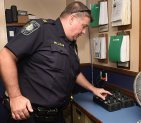Gun — check. Badge — check. Body camera — check.
Clipping a video camera to his chest is not something Central Bucks Regional police Cpl. Cliff Horn ever thought would become part of his pre-shift ritual.
And two years ago, when Horn, then an officer, learned the department would be one of seven Bucks County law enforcement agencies taking part in a pilot program to test out police-worn body cameras, he was not exactly enthused.
"We're creatures of habit," said Horn, a cop since 1992, during a recent interview from the police station in Doylestown Borough. "We like things to be very structured and now there was something new being thrown into the routine."
But over time he's changed his tune.
He says the cameras often reduce tensions immediately. When everyone involved in a police response call knows that tape is running, it tends to de-escalate situations pretty quickly, he added.
The footage also aids him in writing accurate, detailed reports.
Horn quickly realized the cameras would have a permanent place in the police tool box.

The department now has 23 cameras in rotation, used by every officer during every shift.
Local
Breaking news and the stories that matter to your neighborhood.
State police announced its own pilot program in June, taking advantage of $52,000 in federal grant money to develop a program and purchase 30 cameras to be used through 2018.
Last year, the Philadelphia Police Department spent $12.5 million to equip all 4,000 patrol officers with the devices following a 2014 pilot program.
Police in Montgomery County are still in the early stages of exploring and acquiring the technology. Plymouth Township police Chief Joseph Lawrence, who also serves as president of the Police Chiefs Association of Montgomery County, said his department is the only one in the county to have body cameras.
But the majority of Montgomery County police forces will likely pursue body cameras in 2019, he said.
In Bucks County, as many set-in-their-ways veteran cops have come around to see the positives in rolling tape, some police departments have yet to get on board.
The reason, according to some police officials, lies beyond the lens.
Hidden costs need to be considered when implementing a body camera program, they say.
"Storage is huge," said Central Bucks Capt. Robert Milligan. "We keep (all footage) no less than 90 days depending on what it is."

Central Bucks Regional Police spent $13,792 to upgrade the department's servers with 96 extra terabytes of storage — an expense not covered by the $52,805 in grant money secured by the coalition of Bucks County police forces. Milligan believes that amount of space should be enough to accommodate all the footage recorded in the foreseeable future.
The department bought three docking stations at $1,500 apiece. Each camera costs about $1,000 with the mount used to clip it onto the uniform running about $50 each, Milligan said.
"And that's just for our 27-officer department," he said, noting that larger forces would incur far larger costs.
Bensalem Director of Public Safety Fred Harran said outfitting his 100 officers with cameras would cost more than anywhere else in the county.
"There's always grants for the hardware," said Harran. "The problem is the (storage) space and everything that goes along with that. A human has to maintain all of that. We already have a full-time guy that handles all of our in-car (dashboard) camera footage. A lot goes into maintaining these."
With the proliferation of the technology across the country, Harran said he can't help but look at some vendors' rates from time to time, but the township is not in the position yet to move forward with buying body-worn cameras.
That is likely to change soon.
"They are probably coming for us in the future," he said.
Buckingham police were initially part of the body camera coalition, but backed out late in the process.
The department was in transition, as longtime Chief Steven Daniels was getting ready to retire.
The timing just wasn't right, said Lt. J.R. Landis.
"We were also waiting for the law to catch up with the technology," Landis said.
One deterrent, according to Harran, was the wiretapping law in place when the 2016 pilot program in Bucks County began.
"That was one of the main reasons I stayed away from (body cameras)," he said. "It's got to work right or it won't work at all."
In 2017, Pennsylvania Gov. Tom Wolf signed Act 22 into law, which restructured where police could record footage — and how the public can request to see it.
Prior to Act 22, police were restricted from recording inside homes if the owner did not give consent.
"We jokingly said it was kind of like being a vampire — we had to be invited into the house," Central Bucks' Milligan said.
Police are no longer obligated to turn off their cameras but most departments do have discretionary policies in place that advise officers to stop rolling out of respect for victims of such sensitive topics like sexual misconduct or rape, said Milligan.
Nor do officers need to inform people they are being recorded, as was previously mandated.
But Milligan said the department's best practice policy recommends that officers still do so.
The requesting of footage no longer falls under the Right to Know Law.
The public still goes through an agency's open records officer with the initial request, but if the footage is deemed to be evidence in a criminal case or open investigation or contains information about victims the request can be denied.
Previously, when a denial occurred, an appeal could be sent to the Pennsylvania Office of Open Records. Appeals are now handled by the Court of Common Pleas.
But because the legal landscape that existed before Act 22's passage was so restrictive, there was rarely any controversial footage recorded, much less sought after by the public through an appeal, said PA's Office of Open Records Executive Director Erik Arneson.
While he said it's "still pretty early in the life of the new law" to make any definitive judgments on its effect, Arneson is confident that time will tell.
"I think a lot of the law is really right on point," he said. "I do applaud the fact that there is a clear ability to release video even without a request. I think that a lot of police departments and district attorneys will probably take that step proactively when there's a case of public interest. I think there's a clear procedure. ... They clearly modeled significant portions (of Act 22) on the Right to Know Law and I think that's good, too, to help minimize confusion."
Arneson said body cameras, if used properly, can be a benefit to both police and the public.
"I hope that police departments in Pennsylvania lean toward transparency. ... I think that would make it even more positive," he said.
While Buckingham may have bowed out of the coalition a few years back, police Chief Michael Gallagher, who was hired late last year, says it's likely they will soon pursue the technology.
He's already spoken to the township's board of supervisors and to several camera vendors.
For Gallagher, part of the decision comes down to priorities.
"We see a lot of benefits to this, however a little bit of homework needs to be done before we jump in," Gallagher said. "Ultimately there's only one pot of money and if you're going to use a bit of that pot in order to get video, you're going to lose some type of service that you did somewhere else."
Complaints against the 21 officers on the force have basically been nonexistent, according to Gallagher, which allows for diligent research into the decision.
"We don't have officers making decisions that people are questioning right now — but that could happen tomorrow," he said. "We know that."
Gallagher said he understands how officers worry about organizational changes and how bringing in new procedures and technology can bring with it angst.
"But in the long run it may prove to be a very valuable tool to help them through these tough situations," he said.
Morrisville police have been wearing cameras since 2015.
Aside from wear and tear — which leads to replacements being needed every two years or so — Chief George McClay said the cameras are well worth the investment.
"Complaints are down and we use them for judicial purposes and in writing reports," he said. "You're protecting your officers and the citizens out there from people not telling the truth."
McClay said the department spent several thousand dollars in expanding storage space on its servers but he anticipates it should eventually be able to be recycled and reused after some footage is erased.
He also said there was an adjustment period for his officers back when the program started.
And now?
"My guys won't go on the street without them," he said.



